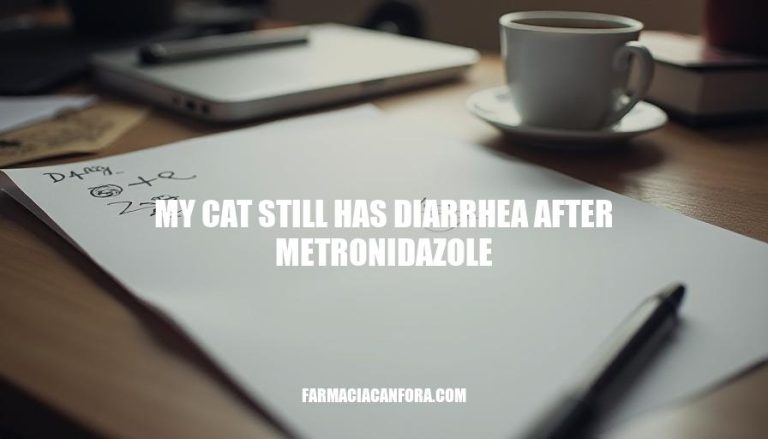


My cat still has diarrhea after taking medicine. It’s really tough on pet owners when their pets don’t get better. Let’s figure out why this is happening and what we can do to help our cats feel better.
Metronidazole, also known by its brand name Flagyl, is an antibiotic and antiprotozoal medication. It is commonly used to treat infections caused by anaerobic bacteria and certain parasites. Metronidazole works by disrupting the DNA synthesis of these bacteria and protozoa, leading to their death.
In cats, metronidazole is often prescribed to treat diarrhea, particularly when it is caused by infections such as those from Clostridium, Giardia, or Tritrichomonas foetus.
The medication is usually administered orally, and it is important to follow the veterinarian’s dosage instructions carefully.
However, if your cat still has diarrhea after taking metronidazole, it could indicate that the underlying cause of the diarrhea has not been fully addressed. It is important to consult your veterinarian for further evaluation and treatment options.
Incorrect Dosage: Administering too little metronidazole may not effectively treat the infection, while too much can cause toxicity and worsen diarrhea.
Underlying Conditions: Conditions like inflammatory bowel disease (IBD), intestinal parasites, or other gastrointestinal disorders can persist despite treatment.
Antibiotic Resistance: The bacteria causing the diarrhea may be resistant to metronidazole, rendering the treatment ineffective.
Side Effects of Metronidazole: Metronidazole itself can cause diarrhea as a side effect, even while treating the condition.
Dietary Factors: Changes in diet or food intolerances can contribute to ongoing diarrhea.
Secondary Infections: The initial infection might have been treated, but a secondary infection could be causing persistent diarrhea.
Stress: Cats can experience stress-related gastrointestinal issues, which might not resolve with antibiotics alone.
Incomplete Treatment Course: If the full course of medication wasn’t completed, the infection might not be fully eradicated.
Drug Interactions: Other medications your cat is taking could interfere with the effectiveness of metronidazole.
Chronic Conditions: Chronic conditions like liver or kidney disease can cause ongoing gastrointestinal symptoms, including diarrhea.
Monitor your cat for the following symptoms after metronidazole treatment:
Persistent diarrhea: If diarrhea continues beyond 24-48 hours.
Blood in stool: Presence of fresh blood or black, tarry stools.
Vomiting: Frequent vomiting or inability to keep food down.
Dehydration: Signs include lethargy, sunken eyes, dry gums, and decreased skin elasticity.
Loss of appetite: Refusal to eat or drink.
Lethargy: Unusual tiredness or weakness.
Neurological signs: Uncoordinated movements, head tilting, or seizures.
Weight loss: Significant decrease in body weight.
Other signs of illness: Coughing, sneezing, or other unusual behaviors.
Seek veterinary advice immediately if your cat exhibits any of these symptoms. It’s crucial to consult a veterinarian for a proper diagnosis and treatment plan. Delaying professional consultation can lead to worsening conditions and complications.
Always follow your vet’s instructions and complete the full course of prescribed medication. Your vet may need to adjust the treatment or investigate other underlying causes of the diarrhea.
If your cat still has diarrhea after metronidazole, there are several alternative treatments and next steps to consider:
Dietary Changes:
Bland Diet: Offer a bland diet consisting of boiled chicken and white rice. This can help soothe the digestive system.
High-Fiber Diet: Increase fiber intake with plain pumpkin puree or psyllium husk supplements. Fiber can help regulate bowel movements.
Low-Carb, High-Protein Diet: Consider a diet that is low in carbohydrates and high in protein.
Probiotics:
Probiotic Supplements: Add probiotics to your cat’s meals to restore the balance of good bacteria in the gut.
Probiotics can help improve digestive health and reduce diarrhea.
Other Medications:
Tylosin: This macrolide antibiotic can be used as an alternative to metronidazole for treating diarrhea and gastrointestinal inflammation.
Rifaximin: This antibiotic is effective for inflammatory bowel disease (IBD) and chronic diarrhea.
Clindamycin Hydrochloride: This medication can be used for various infections and protozoan diseases.
Fenbendazole: An antiparasitic that can be effective for giardiasis and other protozoal infections.
It’s important to consult your veterinarian before making any changes to your cat’s treatment plan. They can help determine the underlying cause of the diarrhea and recommend the most appropriate course of action.
It may indicate that the underlying cause of the diarrhea hasn’t been fully addressed. Consult your veterinarian for further evaluation and treatment options.
Possible reasons include:
Monitor your cat for:
Seek veterinary advice immediately if you notice any of these symptoms.
Your veterinarian may adjust the treatment or investigate other underlying causes of the diarrhea.
Alternative treatments include:
Consult your veterinarian before making any changes to your cat’s treatment plan.